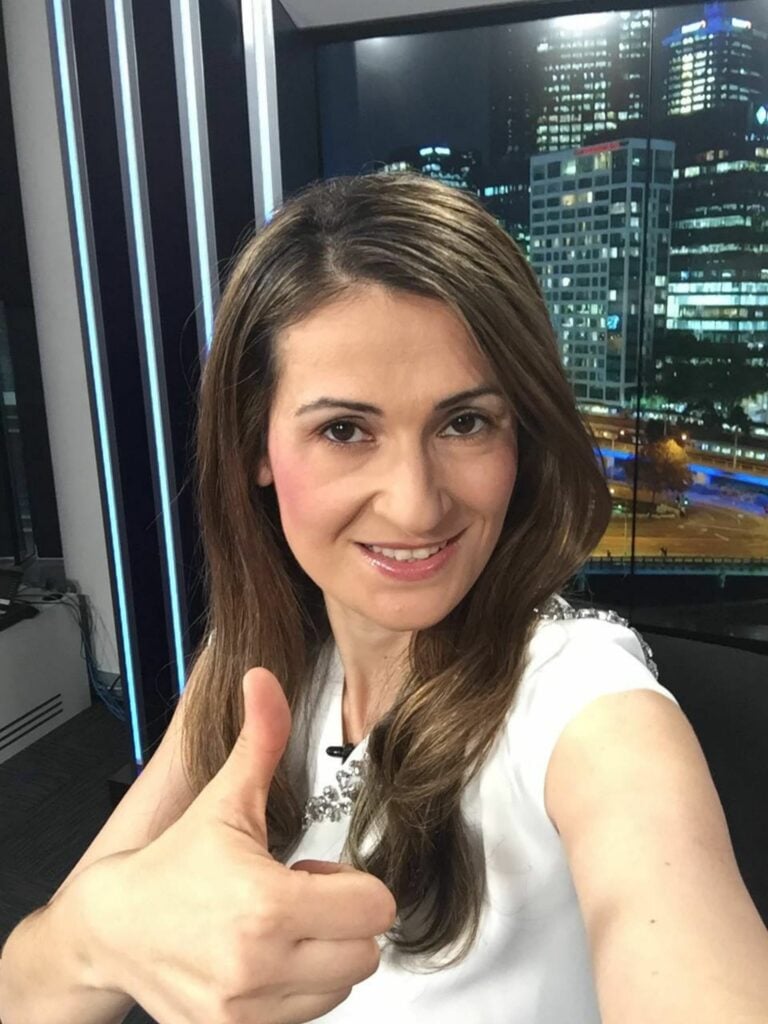Patricia Karvelas attended University High School where she wrote for the school magazine and began broadcasting on a Melbourne community radio station while still at school. She is a graduate of RMIT University in Melbourne.
A driven journalist since 2000, Ms Karvelas began working with the ABC and SBS. She went on to cover federal politics as a newspaper journalist for The Australian. In 2008, Ms Karvelas was the recipient of the inaugural Wallace Brown Press Gallery Young Journalist of the Year Award.
In 2016, she hosted Karvelas, a weekly current affairs program on Sky News Australia.
The following year, she moved to ABC News to host the weekly current affairs television program National Wrap in 2018. She also hosted Afternoon Briefing for the ABC News Channel each day before going on to host RN Drive. She co-hosted the weekly podcast The Party Room with Fran Kelly.
In a recent interview, you said of your background that it “allowed for diversity of hosts of different backgrounds and experiences”. What do you think you bring from your Greek background to your role at RN Breakfast?
I am a proud Greek-Australian and I think like many children of immigrants I grew up keenly aware of the privilege of living in a country with so many opportunities but equally the difficulties of navigating them coming from a family where English was not the first language. RN Breakfast is a national radio show and should reflect and cover the diversity of this country including its vast cultural diversity.
What is the story of your family, from which part of Greece do they originate?
My parents migrated to Australia together and came from the Peloponnese region of Greece in the South. My father was a carpenter and had the skills the country was desperate for at that time. Like many migrants adjusting to Australia wasn’t always easy but my family were part of a large diaspora community and were keen for us to get a first-class education and pursue big careers in Australia as Australians. (Her parents died when she was eight years old and she was raised by her maternal grandmother and her two older sisters, Sue and Voula).

How big a part in your family life and career is the Greek sensibility?
I have many identities and parts of who I am but certainly my cultural heritage is a significant part of who I am. My Greek upbringing and the values that upbringing instilled have been key to who I am and I continue to raise my own children with a strong sense of culture and identity.
You began your career in broadcast journalism for BSS and ABC and have also worked on television and as a newspaper journalist for the Australian as well as Australian Bureau. How are you able to adapt to the requirements of each media? Which media do you most enjoy working in and why?
I am a journalist first and foremost and journalists just love stories – for me the medium isn’t the important part it is telling the important stories. I have loved newspapers, TV and radio for different reasons but I think the immediacy of radio and communicating in such a direct and intimate way with listeners is very special.
What aspects have you had to change in your presentation style over the years?
I have always worked to be the best presenter I can be and worked on my craft, but ultimately my style reflects me and my own personality. When I’m on air you get my full self – and so I think my listeners know exactly who I am and what to expect.
How does RN Drive content and audience differ from RN Breakfast?|
Breakfast is always a really important part of the day in the media cycle because it’s when the agenda is set for the day and the audience is there wanting to hear what is happening and what to expect.
How much work goes on behind (and before) the scenes for both shows that we are not aware of?
I am just the voice of the show – behind me are producers and sound engineers who craft interviews and pursue the most newsworthy guests to bring the most comprehensive program possible to our audience. Behind a big show is always a lot of hard work and trial and error and intense energy.
READ MORE: Karvelas talks misogyny in the newsroom
Does social media pose a serious challenge to traditional media? Should it be view as a complementary media at its best?
Social media is a way of communicating with a bigger audience but it will never replace the role of primary journalism where the hard work to bring accurate information is delivered.
What are the worst aspects of news dissemination through social media?
Social media can be a very negative place where people hide behind anonymity to attack. It is not in my view worth engaging with those who don’t want a healthy discourse.
What are your other interests outside of journalism? What do you do to relax?
I love politics and international affairs and news so my job happens to coincide with what I love to do. But beyond work most of my time is spent raising my two daughters and I love the outdoors too – I am a runner and I love exploring the vast greatness of this country.